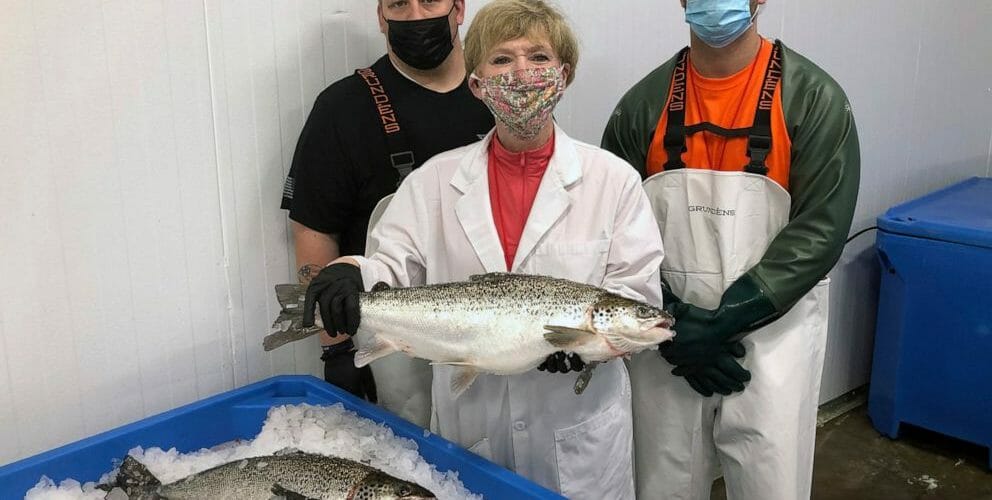The following report is from ABC News:
INDIANAPOLIS — The inaugural harvest of genetically modified salmon began this week after the pandemic delayed the sale of the first such altered animal to be cleared for human consumption in the United States, company officials said.
Several tons of salmon, engineered by biotech company AquaBounty Technologies Inc., will now head to restaurants and away-from-home dining services — where labeling as genetically engineered is not required — in the Midwest and along the East Coast, company CEO Sylvia Wulf said.
Thus far, the only customer to announce it is selling the salmon is Samuels and Son Seafood, a Philadelphia-based seafood distributor.
AquaBounty has raised its faster-growing salmon at an indoor aquaculture farm in Albany, Indiana. The fish are genetically modified to grow twice as fast as wild salmon, reaching market size — 8 to 12 pounds (3.6 to 5.4 kilograms) — in 18 months rather than 36.
The Massachusetts-based company originally planned to harvest the fish in late 2020. Wulf attributed delays to reduced demand and market price for Atlantic salmon spurred by the pandemic.
The impact of COVID caused us to rethink our initial timeline … no one was looking for more salmon then. We’re very excited about it now. We’ve timed the harvest with the recovery of the economy, and we know that demand is going to continue to increase.
Sylvia Wulf
Although finally making its way to dinner plates, the genetically modified fish has been met by pushback from environmental advocates for years.
The international food service company Aramark in January announced its commitment to not sell such salmon, citing environmental concerns and potential impacts on Indigenous communities that harvest wild salmon.
The announcement followed similar ones by other major food service companies — Compass Group and Sodexo — and many large U.S. grocery retailers, seafood companies and restaurants. Costco, Kroger, Walmart and Whole Foods maintain that they don’t sell genetically modified or cloned salmon and would need to label them as such.
The boycott against AquaBounty salmon has largely come from activists with the Block Corporate Salmon campaign, which aims to protect wild salmon and preserve Indigenous rights to practice sustainable fishing.
Genetically engineered salmon is a huge threat to any vision of a healthy food system. People need ways to connect with the food they’re eating, so they know where it’s coming from. These fish are so new — and there’s such a loud group of people who oppose it. That’s a huge red flag to consumers.
Jon Russell, a member of the campaign and a food justice organizer with Northwest Atlantic Marine Alliance
Wulf said she’s confident there’s an appetite for the fish.
Most of the salmon in this country is imported, and during the pandemic, we couldn’t get products into the market. So, having a domestic source of supply that isn’t seasonal like wild salmon and that is produced in a highly-controlled, bio-secure environment is increasingly important to consumers.
AquaBounty markets the salmon as disease- and antibiotic-free, saying its product comes with a reduced carbon footprint and none of the risk of polluting marine ecosystems like traditional sea-cage farming carries.
Despite their rapid growth, the genetically modified salmon require less food than most farmed Atlantic salmon, the company says. Biofiltration units keep water in the Indiana facility’s many 70,000-gallon (264,979-liter) tanks clean, making fish less likely to get sick or require antibiotics.
The FDA approved the AquAdvantage Salmon as “safe and effective” in 2015. It was the only genetically modified animal approved for human consumption until federal regulators approved a genetically modified pig for food and medical products in December.
In 2018, the federal agency greenlit AquaBounty’s sprawling Indiana facility, which is currently raising roughly 450 tons (408 metric tons) of salmon from eggs imported from Canada but is capable of raising more than twice that amount.
But in a shifting domestic market that increasingly values origin, health and sustainability, and wild over farmed seafood, others have a different view of the salmon, which some critics have nicknamed “Frankenfish.”
Part of the domestic pushback revolves around how the engineered fish is to be labeled under FDA guidelines. Salmon fishermen, fish farmers, wholesalers and other stakeholders want clear labeling practices to ensure that customers know they’re purchasing an engineered product.
USDA labeling law directs companies to disclose genetically-modified ingredients in food through use of a QR code, an on-package display of text or a designated symbol. Mandatory compliance with that regulation takes full effect in January, but the rules don’t apply to restaurants or food services.
Wulf said the company is committed to using “genetically engineered” labeling when its fish are sold in grocery stores in coming months.
In November, U.S. District Judge Vince Chhabria in San Francisco affirmed that the FDA had the authority to oversee genetically engineered animals and fish. But he ruled that the agency hadn’t adequately assessed the environmental consequences of AquaBounty salmon escaping into the wild.
The company argued that escape is unlikely, saying the fish are monitored 24 hours a day and contained in tanks with screens, grates, netting, pumps and chemical disinfection to prevent escape. The company’s salmon are also female and sterile, preventing them from mating.
Our fish are actually designed to thrive in the land-based environment. That’s part of what makes them unique. And we’re proud of the fact that genetically engineered allows us to bring more of a healthy nutritious product to market in a safe, secure and sustainable way.
Sylvia Wulf
AUTHOR COMMENTARY
[1] Now the Spirit speaketh expressly, that in the latter times some shall depart from the faith, giving heed to seducing spirits, and doctrines of devils; [2] Speaking lies in hypocrisy; having their conscience seared with a hot iron; [3] Forbidding to marry, and commanding to abstain from meats, which God hath created to be received with thanksgiving of them which believe and know the truth. [4] For every creature of God is good, and nothing to be refused, if it be received with thanksgiving: [5] For it is sanctified by the word of God and prayer.1 Timothy 4:1-5
WinePress readers now that have been reporting on the massive push, that now more than ever, has been sent into overdrive to get the masses to stop eating real meat and convert to the artificial and lab-grown meats.
Proposed Law In Oregon Would Ban Breeding And Slaughtering Livestock
Wisconsin Becomes 20th State To Dump Human Remains In Sewers And For Fertilizers
Scientists Create Lab-Grown Meat From Spinach
Beyond Meat Alters It’s Ingredients. Plans To Unveil Plant-Based Chicken
Doctors Warn Of Russian Flu Virus From Ducks Could Cause A New Pandemic
As I have been warning about for some time now, the elites will have to launch a new crisis or expand the Covid pandemonium to propagandize the people into thinking livestock and other animals are harbingers for Covid, allowing for the justification to holocaust livestock (cattle, chicken, ducks, lamb) and other wild animals such as deer or even fish. Presuming that occurs, the masses will flock to the disgusting and health-hazardous GMOs, willingly and happily. After all, its “cheaper and has the same great taste you know and love” – they’ll say.
The WinePress needs your support! If God has laid it on your heart to want to contribute, please prayerfully consider donating to this ministry. If you cannot gift a monetary donation, then please donate your fervent prayers to keep this ministry going! Thank you and may God bless you.







